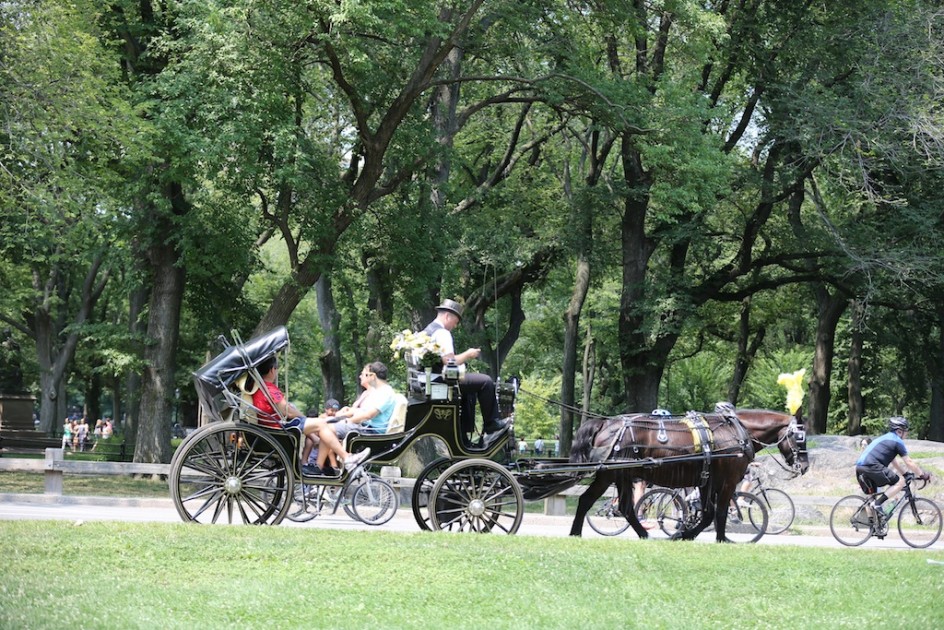
The New York Times reports this morning that the mayor’s office in New York appears to tie enormous increases in City Council salaries to the upcoming vote that will confine the carriage horses to Central Park, force the sale of the horse stables, send many horses into peril, and radically restrict the carriage trade.
Some people call this proposal an “agreement in principle” to save the carriage trade, I think of it as the Carriage Trade Restriction And Shrinking Act (SMELLS BAD) of 2016.
An advisory commission had recommended raising the council members salaries by 23 per cent, said the Times, but new legislation, proposed suddenly and hurriedly by the mayor’s top political advisers, would now raise the council members salaries much more, to $148,500 a year. This new legislation has been rushed to the council to coincide with its vote on the carriage trade bill.
“…the amount of the raise is notably higher than what the commission suggested,” said the newspaper.”
And some fear that the higher salaries might be the result of a different sort of concession, linked to the mayor’s plan to shrink the horse-carriage industry in Manhattan.”
The maneuvers to sign off on the pay bill were occurring under a deadline of sorts: Because the bills were finalized by the end of the day on Thursday, they could be voted on next Friday, the same day the Council is expected to vote on the horse-carriage bill.
The City Hall officials were said to be focusing on enticing city lawmakers who were alarmed by a hearing last week, where administration officials could not answer basic questions about some of the bill’s provisions, like the cost or location of a new stable in Central Park, the extent of the alleged safety threat caused by the horses, the number of people who might lose their jobs.
I imagine a 30 per cent pay raise without any public hearing or approval might change a political mind or two.
Asked about the timing of the two bills being voted on together, Councilman David Greenfield, a Brooklyn Democrat, said, “I don’t think it reflects well on us.”
For sure.
It often seems this issue ought to be hear before a Grand Jury, not the City Council. Honestly, I read this new report and wondered if this could possibly be legal. What, after all, is a bribe? According to the legal dictionary, a bribe occurs when someone is persuaded to act on one’s favor, typically illegally or dishonestly by a gift of money or other inducement.
I am not a lawyer, but the definition seems to fit what is happening more precisely than any other explanation, even real estate. Carriage trade officials have testified that the mayor’s proposal as it now stands will put most, if not all, of the carriage owners out of business.
The Teamsters Union, the Mayor’s Office, the Speaker of the New York City Council and the animal rights organizations seeking a ban on the carriage trade, are now all in agreement that the carriage trade ought to be moved at public expense to Central Park. Some drivers agree, some don’t. The Teamsters have been seeking to eliminate some of the most noxious restrictions on the trade in the bill, so far they have been rebuffed.
The City Council hearing on Friday raised numerous and critical questions that the city couldn’t or wouldn’t answer.
Rather than wait until these questions are addressed – time is not on the mayor’s side, he really has no just or proven cause to restrict the carriage trade, opposition will only grow – his office has rushed to present a bill giving the council members a huge raise if they will vote on the carriage trade at the same time.
It doesn’t really matter if this bribe has been made explicit or not, it seems rather obvious.
This after it becomes increasingly apparent that the only reason the mayor is pursuing the trade so aggressively is that he received enormous amounts of money from animal rights organizations to do that, it was a central campaign promise. What, I wonder, does a public official have to do in New York City to get investigated?
At the City Council hearings, several things did become clear, despite the confusion.
l. There is no safety and health issue involving the carriage horses. In all of the carriage trade history, no human being has been killed by a carriage horse (154 years.) In a half-century, and after about a half-million rides, no horse has been killed working in New York City traffic. Thus, the city has no interest in restricting the industry.
2. There is nothing resembling a coherent plan to build or refurbish a new stable in New York in less than two years, there is yet no location, no approval by the five different city boards necessary, no funding. No complex public project in New York history has ever been completed in such a short time.
3. If the bill passes in its current form, the carriage trade will be forced to sell its stables, lay off scores of people, send more than 100 horses out of their safe and secure jobs, and cease to exist as an independent, economically viable entity. They will become another tourist concession in the park, a ward of the very government out to destroy them, invisible and irrelevant to the city or its people. A way stop for tourists with money. Sometimes, it seems the “agreement in principle” is a suicide pact, not a resolution. Why else would the mayor and the animal rights groups possibly support it and push so hard for its passage?
4. The bill is not rational. Without a committed home for the carriage trade to go to, and having been removed from city streets and had their hours and the number of horses severely restricted regardless, the mayor will have, in effect, cannibalized a healthy, popular, profitable, law-abiding industry for no reason at all.
